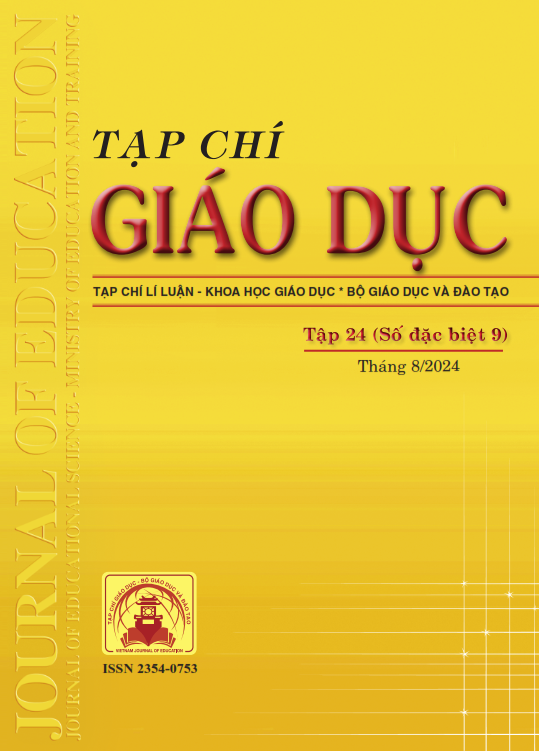Chuyển đổi số thúc đẩy tính bền vững trong giáo dục đại học: Tiếp cận từ quan điểm của các nhà nghiên cứu
Tóm tắt
Sustainability in higher education involves embedding sustainable development principles into core university activities, including environmentally friendly operations, promoting social equity, and ensuring economic viability. Universities play a key role in promoting sustainability through research, teaching, and community service. The relationship between digital transformation and sustainability in higher education is a promising area of research. By leveraging digital technologies, universities can enhance their sustainability efforts in a variety of ways. However, the impact of digital transformation on sustainability is not all positive, as increased reliance on digital infrastructure can lead to higher energy consumption and e-waste. This study aims to provide an overview of how digital transformation can support and promote sustainability in higher education from an academic perspective based on scientific publications in prestigious journals, thereby proposing some recommendations and directions for further research in the future. This is considered a useful reference in applying perspectives to production issues and developing activities to promote sustainability in higher education.
Tài liệu tham khảo
Arizona State University (2021). Sustainability at ASU. https://sustainability.asu.edu/
Barth, M., & Rieckmann, M. (2016). State of the art in research on higher education for sustainable development. Handbook of Higher Education for Sustainable Development (pp. 100-113). Routledge.
Bashshur, R., Shannon, G., Krupinski, E., & Grigsby, J. (2013). Sustaining and realizing the promise of telemedicine. Telemedicine and e-Health, 19(5), 339-345.
Bates, T. (2019). Teaching in a Digital Age: Guidelines for Designing Teaching and Learning. (2nd ed.) Tony Bates Associates Ltd.
Bullen, M., & Morgan, T. (2015). Digital Learners in Higher Education: Generation is Not the Issue. Canadian Journal of Learning and Technology, 37(1), 12-27. https://cjlt.ca/index.php/cjlt/article/view/26364/19546
Cahaya, A., Yusriadi, Y., & Gheisari, A. (2022). Transformation of the Education Sector during the COVID‐19 Pandemic in Indonesia. Education Research International, 2022(1), 8561759. https://doi.org/10.1155/2022/8561759
Carayannis, E. G., & Morawska-Jancelewicz, J. (2022). The futures of Europe: Society 5.0 and industry 5.0 as driving forces of future universities. Journal of the Knowledge Economy, 13, 3445-3471. https://doi.org/10.1007/ s13132-021-00854-2 Cortese, A. D. (2003). The critical role of higher education in creating a sustainable future. Planning for Higher Education, 31(3), 15-22.
Daniel, B. (2015). Big data and analytics in higher education: Opportunities and challenges. British Journal of Educational Technology, 50(5), 1455-1473.
Davis, F. D. (1989). Perceived usefulness, perceived ease of use, and user acceptance of information technology. MIS Quarterly, 13(3), 319-340.
Dhawan, S. (2020). Online learning: A panacea in the time of COVID-19 crisis. Journal of Educational Technology Systems, 49(1), 5-22. https://doi.org/10.1177/004723952093401
Elkington, J. (1997). Cannibals with Forks: The Triple Bottom Line of 21st Century Business. Capstone.
Henriksen, D., Richardson, C., & Mehta, R. (2017). Design thinking: A creative approach to educational problems of practice. Thinking Skills and Creativity, 26, 140-153. https://doi.org/10.1016/j.tsc.2017.10.001
Miki, C. F. A. and et al. (2022). A Smart Campus Framework: Challenges and Opportunities for Education Based on the Sustainable Development Goals. Sustainability, 14(15), 9640. https://doi.org/10.3390/su14159640
Pu, R., Tanamee, D., & Jiang, S. (2022). Digitalization and higher education for sustainable development in the context of the Covid-19 pandemic: A content analysis approach. Problems and Perspectives in Management, 20(1), 27-40. https://doi.org/10.21511/ppm.20(1).2022.03
Rogers, E. M. (2003). Diffusion of Innovations (5th ed.). Free Press.
Second Nature. (2020). The Presidents' Climate Leadership Commitments. https://secondnature.org/
Selwyn, N. (2020). Should Robots Replace Teachers? AI and the Future of Education. (1st ed.) Polity Press.
Stanford University (2020). Sustainability at Stanford. https://sustainable.stanford.edu/
Tilbury, D. (2011). Higher education for sustainability: A global overview of commitment and progress. Higher Education in the World, 4, 18-28.
Trevisan, L. V., Eustachio, J. H. P. P., Dias, B. G., Filho, W. L., & Pedrozo, E. Á. (2024). Digital transformation towards sustainability in higher education: state-of-the-art and future research insights. Environment, Development and Sustainability, 26(2), 2789-2810. https://doi.org/10.1007/s10668-022-02874-7
Trist, E. L., & Bamforth, K. W. (1951). Some social and psychological consequences of the longwall method of coal-getting. Human Relations, 4(1), 3-38.
University of British Columbia (2019). Centre for Interactive Research on Sustainability. https://sustain.ubc.ca/centre-interactive-research-sustainability-cirs
Venkatesh, V., & Davis, F. D. (2000). A theoretical extension of the technology acceptance model: Four longitudinal field studies. Management Science, 46(2), 186-204.
Verhoef, P. C., Broekhuizen, T., Bart, Y., Bhattacharya, A., Dong, J. Q., Fabian, N., & Haenlein, M. (2021). Digital transformation: A multidisciplinary reflection and research agenda. Journal of Business Research, 122, 889-901.
Vial, G. (2019). Understanding digital transformation: A review and a research agenda. Journal of Strategic Information Systems, 28(2), 118-144.
Zguir, M. F., Dubis, S., & Koç, M. (2021). Embedding Education for Sustainable Development (ESD) and SDGs values in curriculum: A comparative review on Qatar, Singapore and New Zealand. Journal of Cleaner Production, 319, 128534. https://doi.org/10.1016/j.jclepro.2021.128534
Zhou, K., Fu, C., & Yang, S. (2016). Big data driven smart energy management: From big data to big insights. Renewable and Sustainable Energy Reviews, 56, 215-225.
Tải xuống
Đã Xuất bản
Cách trích dẫn
Số
Chuyên mục
Giấy phép

Tác phẩm này được cấp phép theo Ghi nhận tác giả của Creative Commons Giấy phép quốc tế 4.0 .












